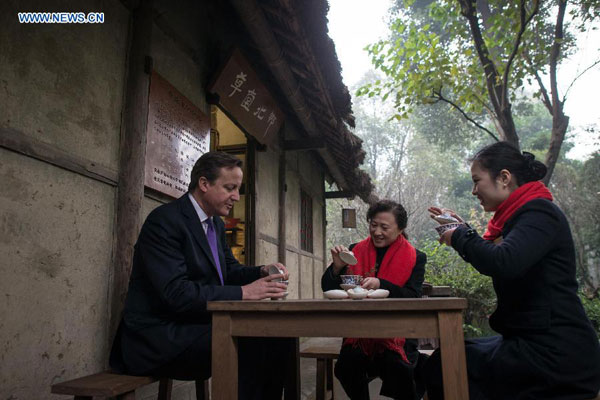 |
| British Prime Minister David Cameron (L) enjoys Chinese tea at the Thatched Cottage of Du Fu in Chengdu, capital of southwest China's Sichuan Province, Dec. 4, 2013. Du Fu was a famous Chinese poet in Tang Dynasty (618-907 A.D.). (Xinhua/Xue Yubin) |
More than a high speed train ride and a hotpot
Prior to his state visit to China from Monday to Wednesday, British Prime Minister David Cameron expressed excitement at the anticipation of a ride in a Chinese high speed train and a hotpot in Chengdu, giving a touch of informality to the official event.
Over the past few years, world leaders like Cameron have often shown that they share the same interests in China as ordinary tourists, “signaling that they really like the country”, according to Yu Jun, professor at the Chinese Academy of Governance who has studied public diplomacy for years.
Expert “chi huo”
Chi huo, the Chinese equivalent of “foodie”, referring to someone who has an ardent interest in food, is a buzzword in China. Now, in the eyes of many Chinese netizens, Cameron can add it to his resume. As a matter of fact, many other world leaders share Cameron’s fondness for Chinese food.
During his visit to China, US President Obama demonstrated considerable proficiency in using chopsticks, considered by many as evidence that he had had plenty of experience eating Chinese food.
Former French President Jacques Chirac enjoyed his favorites Beichuan bean jelly (liang fen) and Sichuan Flavored Secret Recipe Chicken (shu xiang jia chuan ji).
The US Vice President Joe Biden ordered Noodles with soy bean paste (zha jiang mian) in a chao gan’er restaurant that serves traditional Beijing dishes.
And Russian Prime Minister Medvedev sipped Maofeng tea from the Yellow Mountains.
Enthusiasts for Historical sites
The splendid Chinese civilization has provided foreign leaders with multiple options for their schedules in China.
Ever since former US President Nixon’s icebreaking trip to China, many political leaders across the world, including Castro, Chavez, Lee Kuan Yew, Sarkozy and at least five US presidents, have climbed the Great Wall.
As one of “2013’s Most Popular Museums Worldwide” according to Trip Advisor, the largest tourism website in the world, the Terrorcotta Warriors in Xi’an, Shaanxi Province elicited a rare smile from Putin the Tough Man, and Korean President Park Geun-hye remarked “This is a dream come true” after visiting the collection.
Aside from these two most-frequented sites by foreigner tourists, Medvedev chose the rather extraordinary Temple of Lord Bao in Anhui, German Chancellor Merkel went to the more bourgeois Nanluoguxiang in Beijing, whereas Chirac visited the Thatched Cottage of Du Fu in Chengdu.
Chinese speakers - well, more or less
Before the China visit, Cameron registered an account on Sina Weibo, the Chinese equivalent of Twitter, amassing over 200 thousand followers by December 3. Note that all the posts are in Chinese.
Park Geun-hye opened her speech in Tsinghua University in rather awkward Chinese, but was a master of Chinese proverbs and old sayings.
In contrast to leaders who speed-learned Chinese ahead of their visits, former Australian Prime Minister Kevin Rudd is a fluent Chinese speaker, once joking that he could also speak English.
Former Prime Minister of Kazakhstan Massimov took his degree at the Law School of Wuhan University. Returning to his Alma mater as Prime Minister, he insisted on communicating in Chinese, claiming to be “half a Wuhan fellow-townsman”.
“As well as governmental visits at high level, in order to create a rapport in the host country (leaders) have to pursue a more social path, and that’s when cultural exchanges come in handy,” said Zhang Yiwu, Professor with the Chinese Department of Peking University to a People’s Daily reporter.
Edited and Translated by Sun Zhao, People's Daily Online
 Heavy cargo flights taking off
Heavy cargo flights taking off In pictures: PLA's digital equipment
In pictures: PLA's digital equipment  Americans mark Thanksgiving Day with parades
Americans mark Thanksgiving Day with parades Love searching stories in cities
Love searching stories in cities  Shanghai shrouded in heavy fog
Shanghai shrouded in heavy fog Office ladies receive ‘devil’ training in mud
Office ladies receive ‘devil’ training in mud China's first nude photographer
China's first nude photographer Selected sports photos of the week
Selected sports photos of the week Treasure of Chinese culture- Nuo Dance
Treasure of Chinese culture- Nuo Dance  Youths in Night club: photo story
Youths in Night club: photo story Models dazzle at Int'l Yacht Model Pageant
Models dazzle at Int'l Yacht Model Pageant  Crystal scenery in China: Jilin fog glaze
Crystal scenery in China: Jilin fog glaze  Tianjin holds first pole dance championship
Tianjin holds first pole dance championship  Annual Santa Claus parade held in Canada's Montreal
Annual Santa Claus parade held in Canada's Montreal China's aircraft carrier passes through Taiwan Strait
China's aircraft carrier passes through Taiwan StraitDay|Week|Month